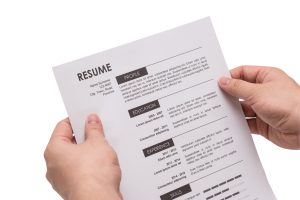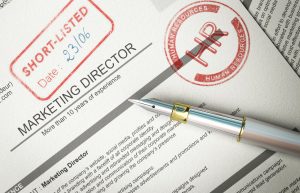Understanding Resume Length
Ideal Length
Remember that less is often more. A one-page resume is typically recommended for most job applications. It allows you to highlight your most relevant experiences and skills concisely.
Having a longer resume doesn’t necessarily mean better chances of getting hired. Recruiters often have limited time to review each application, so a shorter, well-organized résumé can substantially impact more than a lengthy one.
- Pros:
- Concise and easy-to-read
- Highlights critical information effectively
- Cons:
- It may not include all experiences.
- Limited space for details
One-Page vs. Two-Page 
Deciding between a one-page or two-page resume depends on your experience level and employers. A one-page format would be best if you are early in your career or have less than ten years of experience. On the other hand, if you have an extensive work history or accomplishments, a two-page resume might be more suitable.
A two-page resume gives you more room to elaborate on your achievements and showcase various skills and qualifications without overcrowding the page.
- Could you assess your experience level?
- Could you determine whether all information fits within one page?
- If necessary, Please consider moving detailed descriptions to LinkedIn profiles or portfolios.
Resume Length by Experience
Students
When crafting a resume as a student, ensure it is concise and one page long. Include your education, relevant coursework, internships, part-time jobs, and extracurricular activities. Highlight achievements like academic awards or leadership roles stand out.
- Pros:
- Easy to read
- Emphasizes key experiences
- Cons:
- Limited space for details
- It might not showcase all the skills
Entry-Level
For entry-level positions, aim for a one-page resume. Focus on your education and any internships or volunteer work related to the job you’re applying for. Highlight transferable skills like communication or problem-solving abilities.
- Could you list relevant experiences first?
- You can use bullet points to make it clear.
- Examples:
- Internship at ABC Company
- Volunteer work at the Local Community Center
Mid-Level
As a mid-level professional with more experience, expand your resume to two pages if needed. Include detailed descriptions of your work history, accomplishments, and projects undertaken in previous roles.
accomplishments, and projects undertaken in previous roles.
- Key Information:
- Showcase career progression
- Highlight leadership roles
Crafting Your Resume
Achievements Over Duties
When crafting your resume, prioritize achievements over duties. Instead of listing tasks, focus on what you accomplished. For example, instead of saying “responsible for sales,” say “increased sales by 20%.”
Emphasize the impact you had in previous roles. Use quantifiable results to showcase your contributions effectively.
Active Language
Use active language when describing your experiences on a resume. Start bullet points with strong action verbs like “achieved,” “implemented,” or “spearheaded.” This makes your accomplishments more engaging and dynamic.
Using active language helps convey a sense of energy and proactiveness to potential employers reviewing your resume.
Relevant Experience
Ensure that all information on your resume is relevant to the job you are applying for. Tailor each section to highlight skills and experiences that align with the position’s requirements.
Customizing your resume based on the job description increases your chances of catching the recruiter’s attention.
Tailoring Content
Tailor each section of your resume to match the specific job requirements. Highlight relevant skills and experiences that directly relate to the position you are seeking.
Importance of Keywords
. Let’s delve into the significance of keywords.
Keywords Selection
Choosing the right keywords can make or break your resume. They help you stand out from other applicants. For instance, if a job posting requires “customer service skills,” ensure those words are in your resume.
- Using relevant keywords increases your chances of getting noticed by applicant tracking systems.
- Tailoring your resume with specific industry-related keywords showcases your qualifications effectively.
SEO Content Writing
SEO content writing involves strategically incorporating keywords throughout your resume. It’s like optimizing a website for search engines but tailored for job applications.
- Placing keywords naturally within sentences enhances readability and ensures ATS compatibility.
- Balancing the density of keywords ensures they are prominent without overwhelming the content.
Resume Length Guidelines
Experience Levels
 I think that tailoring it based on your experience level is crucial. Keep your resume concise for entry-level positions, focusing on relevant information like education and skills. Expand the document to include detailed work history and accomplishments if you have more experience, such as mid-career professionals.
I think that tailoring it based on your experience level is crucial. Keep your resume concise for entry-level positions, focusing on relevant information like education and skills. Expand the document to include detailed work history and accomplishments if you have more experience, such as mid-career professionals.
A shorter resume for those with limited experience can be one page long. This format ensures hiring managers quickly grasp your qualifications without overwhelming them with unnecessary details. On the other hand, a two-page resume allows you to showcase your achievements effectively if you have extensive expertise in a particular field or industry.
Career Note
Crafting an ideal resume length involves considering where you are in your career journey. As you move professionally, add more details about recent roles and responsibilities. Highlighting promotions or significant projects undertaken over time demonstrates growth and proficiency in your field.
Your career note should reflect the progression of your professional trajectory through clear and concise descriptions of job duties and accomplishments. Including quantifiable achievements like sales figures or project outcomes adds value to your application by providing concrete evidence of success.
Earlier Work History
For individuals with substantial work experience spanning several years, condensing earlier work history is vital when determining the ideal length of a resume. While older roles may significantly shape your career path, focus on emphasizing recent positions that align closely with the job you are applying for now.
Formatting Techniques
Font Size and Spacing
Formatting plays a crucial role in optimizing space. An appropriate font size, such as 10-12 points, ensures readability while maximizing content within one page. Maintaining consistent spacing between sections and paragraphs enhances the overall visual appeal of your resume.
Consider using slightly larger font sizes or bolding to emphasize critical details or headers. This technique helps essential information stand out to recruiters who may quickly scan your resume. You can create a well-organized document that showcases your qualifications by strategically adjusting font sizes and spacing.
Margins Adjustment
Properly adjusting margins is another essential aspect when crafting an ideal-length resume. Setting one-inch margins on all sides creates a balanced layout that prevents overcrowding and maintains readability. Adequate margins also ensure your resume looks professional and neat, enhancing its visual presentation.
By widening the margins slightly if needed, you can create more white space around the content, making it easier for recruiters to navigate your qualifications efficiently. Remember that striking a balance between text and whitespace is critical in creating an aesthetically pleasing yet informative resume design.
Bullet Points Usage
Using bullet points is an effective way to concisely present information on your resume without overwhelming the reader with dense blocks of text. Bullet points help break down achievements, skills, or job responsibilities into easily digestible snippets that capture attention quickly. They allow you to highlight key accomplishments succinctly while maintaining clarity in communication.
Optimizing Resume Content
Condensing descriptions is crucial. Ensure your points are clear and concise, using bullet points instead of lengthy paragraphs. This helps recruiters quickly grasp your qualifications.
Focusing on recent experience is essential for an impactful resume. Highlight roles from the past 10-15 years and emphasize achievements in those positions. Tailor each description to align with the job you’re applying for and showcase your relevant skills and experiences.
Removing irrelevant sections streamlines your resume, making it easier for hiring managers to pinpoint critical information. Omit outdated skills or experiences that don’t add value to your application. For instance, if you’re applying for a marketing role, you can ignore details about unrelated jobs like retail or hospitality.
Pros:
- Clear and concise presentation
- Emphasizes recent accomplishments
- Streamlines resume content
Cons:
- It may require extra effort to tailor each application.
- Risk of omitting potentially useful information
Advanced Tips for Resume Length
Clear Career Stories
When crafting your resume, remember to focus on explicit career stories. Your resume should tell a story about your professional journey. Could you highlight key achievements and experiences that effectively showcase your skills and qualifications? By structuring your resume to include concise yet impactful career stories, you can keep the reader engaged while providing valuable insights into your capabilities.
- Pro tip: Use bullet points or short sentences to outline each career story.
- Pro tip: Tailor each story to align with the job requirements of the position you are applying for.
Summary Inclusion
Including a well-crafted summary at the beginning of your resume can help capture the attention of potential employers quickly. A summary of inclusion that highlights your key strengths, experiences, and career goals. This section introduces the rest of your resume, giving recruiters an overview of what they can expect.
- Pro tip: Keep your summary section limited to a few sentences encapsulating your professional identity.
- Pro tip: Use keywords relevant to the job description in your summary to grab attention effectively.
Active Voice Usage
Using an active voice throughout your resume can make you more than capable of readability and impact. Instead of writing “Responsibilities included,” opt for “Successfully managed.” Active voice conveys confidence and directness, making it easier for recruiters to understand how you contributed in previous roles.
- Pro tip: Begin bullet points with action verbs when describing accomplishments.
- Pro tip: Avoid passive constructions that may dilute the impact of your achievements.
Final Remarks
You’ve now grasped the essence of crafting an impressive resume that strikes the perfect balance in length. Tailoring your resume to suit your experience level, infusing it with relevant keywords, and utilizing effective formatting techniques are crucial. Please remember that a well-optimized resume showcases your skills and captivates the recruiter’s attention quickly.
Many of Deb’s peeps already know about her pet peeve about using cliches on their resume. Her biggest bugabu is the phrase “responsible for”. Bottom line – no one really cares what responsibilities a person held. They care about what you accomplished with the responsibilities you’ve been given. What success stories have you generated to contribute to the company?
Incorporate these insights into your resume-building process, ensuring each section is strategically designed to highlight your strengths. Stay updated on industry trends and continually refine your resume to stay ahead of the competition. Your next job opportunity could be just a standout resume away!
Frequently Asked Questions
What is the ideal length for a resume?
The ideal length for a resume is typically one page for entry-level to mid-level professionals, while senior-level candidates can extend it to two pages. Please make sure to keep it concise with relevant information.
Should I tailor the length of my resume based on experience level?
Yes, adjusting your resume length based on your experience level is crucial. Entry-level applicants should aim for one page, while seasoned professionals can expand to two pages if needed.
How important are keywords in a resume regarding its length?
Keywords play a vital role in resumes as they help ATS systems identify relevant skills and experiences quickly. Incorporate industry-specific keywords naturally throughout your resume content.
Should I focus more on content or formatting when considering the ideal resume length?
Balancing both content and formatting is essential when determining the ideal resume length. Please ensure your content highlights key achievements while using appropriate formatting techniques to enhance readability.
Do you know if there are any advanced tips available for optimizing the length of my resume effectively?
Advanced tips include prioritizing recent and relevant experiences, quantifying achievements with numbers, using bullet points instead of lengthy paragraphs, and eliminating outdated information to maintain an optimal resume length.


0 Comments